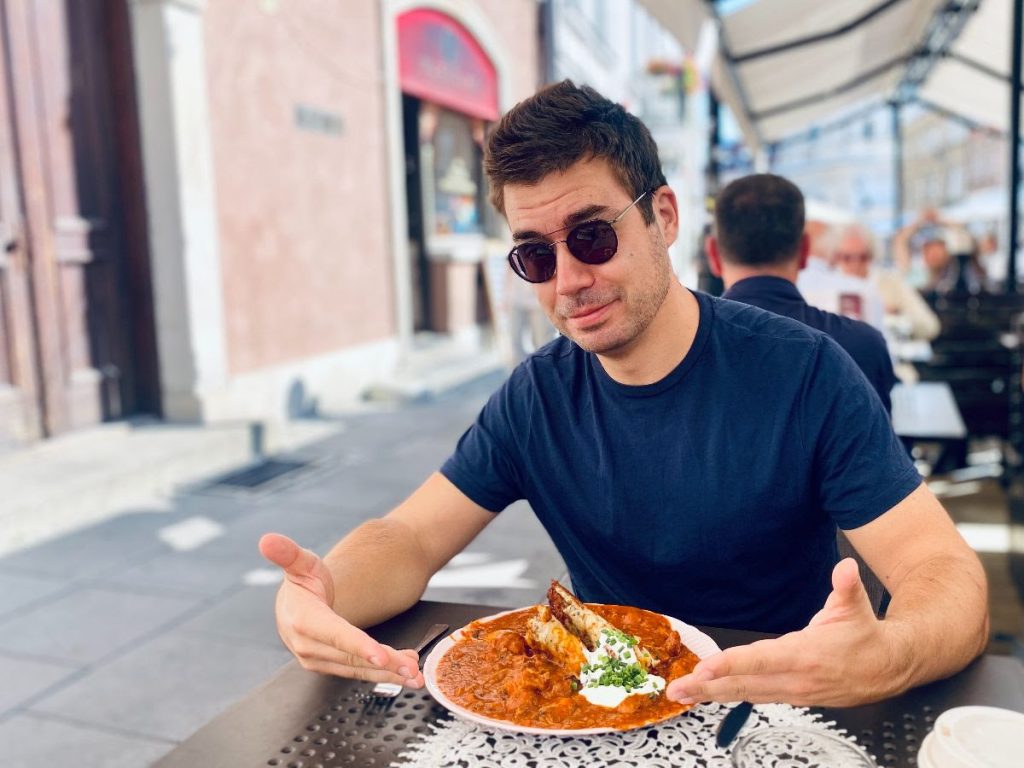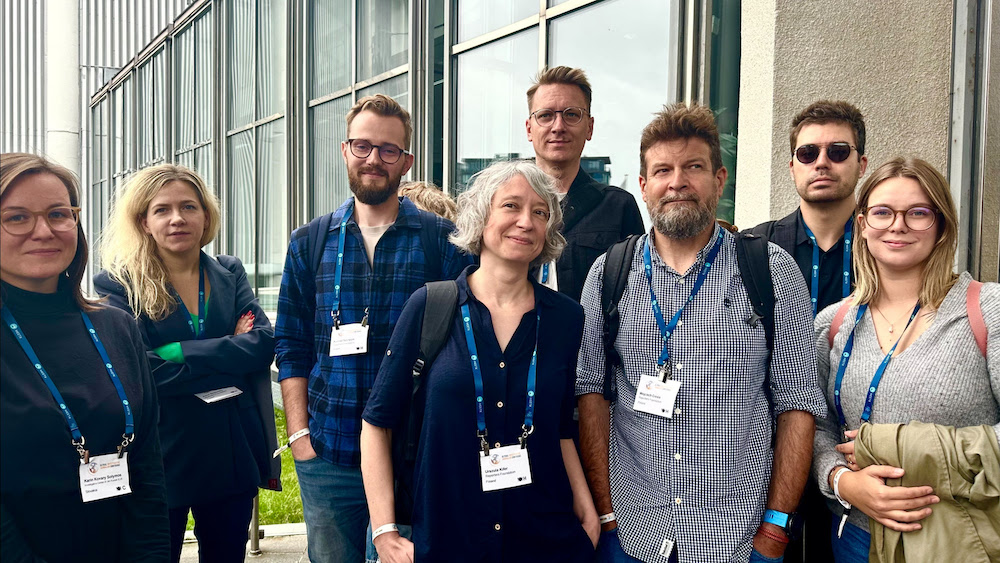Greetings from Warsaw Old Town! As the picture already suggests, the fifth serving of our Goulash newsletter is a special one. What you see above is the Polish version of goulash, which is essentially a Hungarian goulash-inspired stew combined with authentic Polish potato pancakes. This time, we’re focusing on the Slovak and Polish elections, and their possible consequences on Visegrád cooperation. And, of course, we’re proudly presenting our latest investigations into how Ukraine and Russia fight over rail cars in Central Europe, and sharing more of our recent stories, too. Thanks for subscribing to our newsletter, and if someone else forwarded it to you, here’s the link you can use to subscribe. – Szabolcs Panyi, VSquare’s lead Central Europe investigator

Back in 2016, when the soon-to-be founders of VSquare gathered in Warsaw to discuss our cross-border initiative, we worked to come up with a name. Although we eventually settled for VSquare (standing for V4, the Visegrád Four countries), the runner-up name for our site—proposed by Investigace.cz’s Pavla Holcova—was goulash. But no brainstorming session is ever really wasted, and the name will be served as our new newsletter.
SPICY SCOOPS
SLOVAKIA ELECTS, HUNGARY MEDDLES
A few days before Slovakia goes to the polls on September 30, Hungarian Foreign Minister Péter Szijjártó showed up to support the ethnic Hungarian Aliancia-Szövetség (Alliance) party, prompting accusations of meddling in a foreign country’s election. The Hungarian ambassador to Bratislava was even summoned for a dressing-down at the Slovak MFA. In reality, Orbán’s government has been betting on multiple horses in the same race. According to a source with deep knowledge of Slovak-Hungarian relations, Árpád Habony, Orbán’s longtime campaign strategist, helped Peter Pellegrini’s HLAS party last year—back when they were still flying high. Currently, however, Robert Fico’s SMER-SD party is in the lead, and we are already seeing how a Hungarian government-funded think-tank is trying to whitewash the pro-Russian Fico for a US audience. Orbán’s long game here is to try to help assemble an illiberal Slovak coalition.
VISEGRÁD GROUP PRESIDENCY IN AUTOPILOT MODE
Meanwhile, with two crucial elections coming up in Slovakia and Poland (October 15), as well as internal disagreements over Russia’s war, the Visegrád Group’s current Czech presidency is keeping a low profile. “We’re in autopilot mode,” a senior Czech government official told me. Moreover, there’s serious division within the five party Czech coalition over how to handle the V4, and especially Orbán. Some in the conservative ODS party, like senior MP Marek Benda, are strongly pro-Orbán, but the majority—liberals, greens, plus the Czech Ministry of Foreign Affairs as a whole—are strongly against his policies. “Because of this, the overall attitude is very much against the V4. Many colleagues suggest we should quit, but it’s not on the table politically yet,” the Czech official said, adding that Prime Minister Petr Fiala himself also “acknowledges the toxicity of the V4.”
CZECHS DESPERATELY IN NEED OF LIKE-MINDED PARTNERS
The Czech Republic’s obvious regional cooperation alternative for the Visegrád Group format is the Slavkov Triangle with Slovakia and Austria. “But that’s not looking good either, with the far-right FPÖ leading in Austria and a possible return of Fico in Slovakia,” the senior Czech official added. Fico’s return may just blow up these two formats at once. On the upside, however, Prague and Warsaw managed to solve a recent bitter dispute over a coal mining issue. The two countries are very much on the same page on most issues, and “Fiala is also personally close to Morawiecki, which helps,” the source added. At the moment, there’s a lot of thinking inside the Czech MFA on what to do next. One possible way out of their current diplomatic morass might be to keep Poland as a close partner while also establishing deeper ties with key supporters of Ukraine: the Baltic countries.
POLISH ELECTION KEEPS HUNGARY ON THE EDGE
Hungary is as nervous about Poland’s elections as Czechia is about Slovakia’s. Even though, as one Polish government official put it, it would be almost suicidal for the governing PiS (Law and Justice) party to have their politicians photographed campaigning together with Hungarian counterparts (because of the latters’ pro-Russian reputation), it is a Polish opposition victory that might just destroy the illiberal axis. Meanwhile, Hungary still hasn’t decided whom to send as its next ambassador to Warsaw, as incumbent Orsolya Kovács’s tenure has long expired. According to a Polish government official, their understanding is that Budapest is waiting for the election results. If PiS wins, they’d send someone politically well-connected; if the opposition, then probably someone unimportant. Two names already floated are the current ambassador’s brother, folk artist Mihály Rosonczy-Kovács, and consul-general to Kraków Tibor Gerencsér.
POLISH OPPOSITION AFRAID TO SUPPORT INTRODUCING THE EURO
Poland’s election campaign went into a decisive phase—the opposition has been focusing mostly on emphasizing PiS’ hypocrisy with the visa bribery scandal and on highlighting the rapid deterioration of Polish-Ukrainian relations due to the conflict over grain import bans. Meanwhile, the ruling party PiS, which leads in the polls, is busy fiercely attacking Agnieszka Holland’s new movie, which pictures a humanitarian crisis at the Polish-Belarusian border. Meanwhile, and despite the country’s economic crises, discussions around real economic issues have been somewhat missing. For example, there was no serious discussion about Poland entering the eurozone. As we learned, there was a reason. The main opposition force, the Civic Coalition consciously decided to avoid this topic—based on the findings of internal pollings. According to a source close to the campaign staff, there are significantly more Poles against the euro than for it—even among the opposition’s supporters.
CZECH SECURITY ELITE THREATENED BY RUSSIAN HACKING
From emails to financial documents, a Russian ransomware group has allegedly stolen 150,000 files worth 750GBs from the Brno-based University of Defence. The Czech Ministry of Defense tries to downplay the hacking by saying that only non-classified systems were breached. However, according to a source familiar with the hacking’s details, the real problem is that, as is visible from its curriculum, the university teaches not only future military and security officers, but practicing ones as well. Since the other two military academies in Vyškov and Hradec Králové were merged into the one in Brno in 2004, students’ stolen personal information affects a large chunk of the country’s security elite.
Got a nice scoop to include in our Goulash newsletter? Contact me at [email protected]
NEW ON VSQUARE
HOW UKRAINE AND RUSSIA FIGHT OVER RAIL CARS IN EUROPE
This investigation started out of a scoop about Hungary and its state railways being afraid of getting rid of obsolete, stranded Russian rail cars obstructing traffic with Ukraine. It was afraid because the only way to do that would result in Ukraine confiscating those wagons—and Hungary, of course, didn’t want to risk Moscow’s anger. Then the scoop was shared among our partners, and ICJK.sk jumped in and did great, detailed reporting on how Slovakia handled the situation—very differently from Hungary. However, my Polish colleagues had a really hard time mapping the situation there, as local authorities and companies chose not to cooperate and reply to inquiries—understandably, since they let quite a lot of wagons get back to their Russian and Belarusian owners. (Also available in Slovak.)
CONSERVATIVE US LOBBYISTS TRY TO GET THEIR HOOKS INTO THE CZECH REPUBLIC
If you thought that the Czech Republic, Europe’s most atheist country after France, would be infertile ground for US-based ultra conservative groups trying to spread their anti-abortion and anti-LGBT religious agenda, well, think again. Investigace.cz’s Mahulena Kopecká has mapped how Alliance Defending Freedom, a powerful US group linked to Donald Trump, is networking and supporting like-minded local organizations, such as the Alliance for Family. In turn, these Czech ultra-conservatives are getting very close to being able to effectively influence politics by pushing an imported culture war agenda that’s alien to Czechia’s secular culture. (Also available in Czech.)
HOW ESTONIA’S MILITARY INTELLIGENCE SECRETLY HELPED UKRAINE
Delfi.ee’s Holger Roonema, one of the authors of this thrilling interview, told me that it’d be a little too much if I gave it a title like “How Estonia Secretly Saved Ukraine” to the text’s English translation. However, if you read the introduction on how Russia’s most elite airborne troops, the 76th Guards Air Assault Division, were prevented from taking Hostomel airport near Kyiv, you might agree with me. In any event, Colonel Margo Grosberg, Estonia’s recently retired military intelligence chief, gave a rare interview, and it’s full of details and deep insights into what’s happening in Ukraine. According to Grosberg’s sobering assessment, Russia would only need a couple of years to reinforce and be able to attack another neighbor. (Also available in Estonian.)
VICIOUS ATTACKS FORCE JOURNALISTS TO SELF-CENSOR ACROSS THE EASTERN PART OF THE EU
In Slovakia, “despite the murder of a journalist five years ago, the levels of hate and intimidation once again grew to such a degree the journalists themselves admit to self-censorship just to be left in peace.” This is just one sad example of the current reality for journalists in the Eastern part of Europe these days. This collaborative newsletter by OCCRP partners summarizes the threats, harassments, and physical attacks on journalists—as well as some of the rare victories over these challenges. Meanwhile, as one of the subheadings puts it bluntly: the governments do not care.
As the PiS government in Warsaw is struggling to overcome the visa bribery scandal, in which it was caught illegally selling Schengen visas for thousands of euros to third world countries while loudly opposing migration, something similar is brewing in Hungary, too, albeit on a much smaller scale. This article by Atlatszo.hu shows how some private companies linked to Viktor Orbán’s Fidesz party are benefiting from recruiting migrant workers from far-away countries—which is, of course, completely at odds with Orbán’s pledge to close borders and defend white, Christian Europe from all those scary, non-white, non-Christian people.

More than 2000 journalists from 132 countries participated at the Global Investigative Journalism Conference 2023 in Gothenburg, Sweden, where both VSquare and its Central European partners’ teams were present. We discussed many exciting new projects—stay tuned, because we have some cool cross-border stories coming up!
BREWING IN THE BOTTOM
SLOVAKIA’S ELECTION EXPLAINED. It’s not always easy to understand what’s going on in the extremely polarized world of Slovak politics, where the party system is so fragmented that, at present, there are as many as seven parties that may or may not meet the threshold to enter parliament. As ICJK.sk’s Lukáš Diko recently explained to VSquare over a drink, Slovakia’s election system, with its total lack of individual constituencies and a fully proportional voting system, has resulted in strong leaders seemingly constantly launching their own new parties and running them as one man shows. This fragmented and competitive party system is rich with stubborn and headstrong individuals. Recent footage capturing former prime minister Igor Matovič (OĽaNO) and former interior minister Robert Kaliňák (SMER-SD) engaging in a physical confrontation is but one example.
According to the last public polls conducted before the election, former prime minister Robert Fico’s pro-Russian-populist SMER-SD Party is neck-in-neck with the liberal Progressive Slovakia (PS) Party, headed by MEP Michal Šimečka, who’s also a vice president in the European Parliament. In the end, it will all come down to how many and which of those eight other small parties manage to make it into the parliament (the threshold for parties is 5 percent; for two-party, coalitions 7 percent; for multi-party coalitions, 8 percent). This means that the slightest twist of fate or and most random of circumstances may well decide whether Slovakia will be led by pro-Russian, illiberal Fico, who’s not only accused of being in bed with very well-known Slovak oligarchs, but whose victory is much awaited by Viktor Orbán, too.
A lot will also depend on whom Peter Pellegrini decides to support. Pelligrini is Fico’s successor prime minister, but he broke away from SMER-SD to form the center-left HLAS party. Although the Fico-Pellegrini personal relationship is said to be terrible, they do have a shared past—and a transactional mindset. Would Pellegrini enter into a coalition with Fico if SMER-SD supported him as presidential candidate for the 2024 Slovak presidential elections? Time will tell—maybe. In the TV debate before the elections, Pellegrini said that SMER-SD is closer to his party than PS. However, it’s also possible that Fico will fall short of assembling the necessary 76-seats majority in the 150-seats Slovak parliament, even with Pellegrini’s support. Then the next question: what will happen to the far-right Republika party? Would this group, which includes neo-Nazis, offer outside support to a possible Fico minority government? And if so, what would be the reaction of the Party of European Socialists / Socialists & Democrats European party family, to whom Fico’s SMER-SD belongs?
If you liked our scoops, stories and exclusive analysis, give it a try and read some further articles by our partners!
MORE FROM OUR PARTNERS
ANDROMEDA: THE UKRAINIAN PUZZLE. Frontstory.pl, in collaboration with a team of European journalists, has mapped the route of Andromeda, the yacht that German prosecutors suspect of being involved in blowing up the Nord Stream pipelines in the Baltic Sea. Were Andromeda’s sailors all speaking Ukrainian? Or was one of them actually speaking Polish? And why did a shady guy called Rustem A. physically confront Frontstory’s brave journalists in Kyiv when they tried to find out his connection to the company behind the boat tour? (This thrilling piece is available in Polish.)
INSIDE THE CRISIS OF THE HUNGARIAN OPPOSITION. A year and a half has passed since Viktor Orbán’s latest landslide victory in Hungary’s parliamentary elections, and this deep dive by Direkt36.hu now reveals how the defeated opposition couldn’t even find the time to sit down and talk through what went wrong. (Text in English.)
WE TAKE THE CASE OF THE INTERRUPTED AND THEN PROHIBITED PRISON INTERVIEW TO STRASBOURG. Tamás Portik, arguably Hungary’s most famous criminal, agreed to an interview with Atlatszo.hu, to which the Hungarian prison services also agreed. However, some minutes into the interview, it was first stopped, and later totally banned, by the prison authorities. The Hungarian investigative site is now trying to contest this decision at the European Court of Human Rights. (Text in English.)
BYPASSING SANCTIONS. HOW BELARUSIAN UREA GETS INTO THE CZECH REPUBLIC. As this Investigace.cz article reveals, Belarusian companies sometimes don’t even have to be particularly inventive or sophisticated if they want to bypass sanctions and make business inside the European Union. It’s enough for local authorities to just not pay enough attention. (Text in Czech.)
This was VSquare’s fifth Goulash newsletter. I hope you gobbled it up. Come back soon for another serving of Goulash!
SZABOLCS PANYI & THE VSQUARE TEAM
VSquare’s Budapest-based lead investigative editor in charge of Central European investigations, Szabolcs Panyi is also a Hungarian investigative journalist at Direkt36. He covers national security, foreign policy, and Russian and Chinese influence. He was a European Press Prize finalist in 2018 and 2021.







